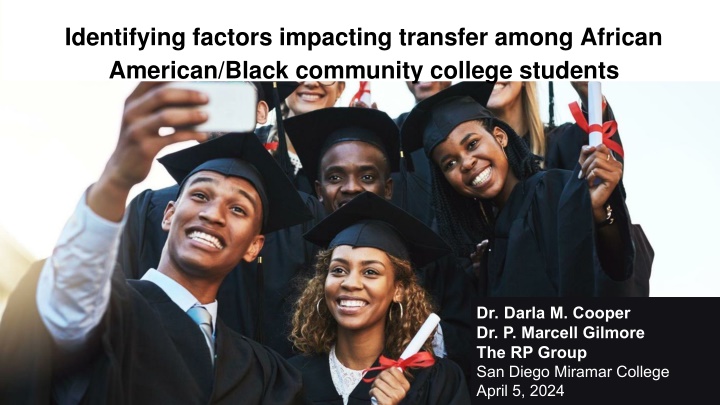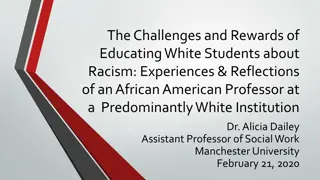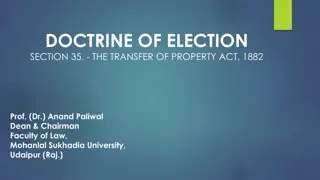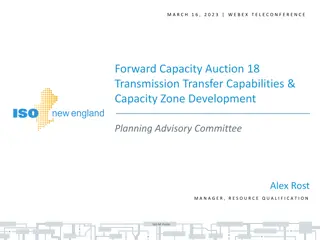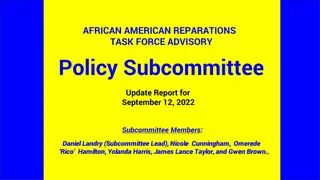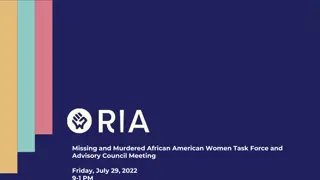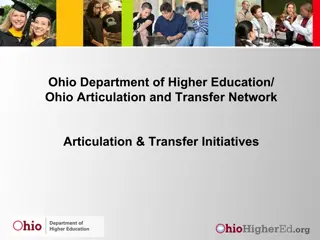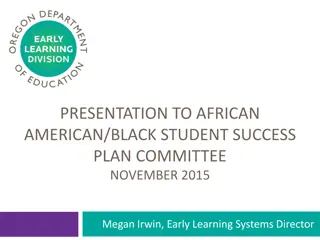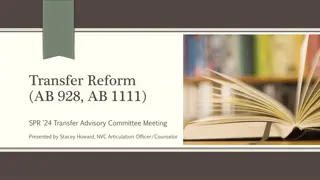Factors Impacting Transfer Among African American Community College Students
The study conducted by Dr. Darla M. Cooper and Dr. P. Marcell Gilmore at The RP Group focuses on identifying the factors influencing transfer rates among African American/Black community college students in California. It highlights the challenges faced by these students in reaching the transfer gate and aims to uncover practices that promote successful transfers. The research involves exploring student course-taking patterns, conducting interviews and surveys, and tracking cohorts to understand the transfer journey better.
Download Presentation

Please find below an Image/Link to download the presentation.
The content on the website is provided AS IS for your information and personal use only. It may not be sold, licensed, or shared on other websites without obtaining consent from the author.If you encounter any issues during the download, it is possible that the publisher has removed the file from their server.
You are allowed to download the files provided on this website for personal or commercial use, subject to the condition that they are used lawfully. All files are the property of their respective owners.
The content on the website is provided AS IS for your information and personal use only. It may not be sold, licensed, or shared on other websites without obtaining consent from the author.
E N D
Presentation Transcript
Identifying factors impacting transfer among African American/Black community college students Dr. Darla M. Cooper Dr. P. Marcell Gilmore The RP Group San Diego Miramar College April 5, 2024
About The RP Group Mission: As the representative organization for Institutional Research, Planning, and Effectiveness (IRPE) professionals in the California Community Colleges (CCC) system, The RP Group strengthens the ability of CCC to discover and undertake high-quality research, planning, and assessments that improve evidence-based decision-making, institutional effectiveness, and success for all students. Services: Research, evaluation, planning, professional development, and technical assistance designed and conducted by CCC practitioners Organization: 501(c)3 with roots as membership organization 2
Through the Gate Mapped California s transfer landscape, identifying a continuum of milestones for the student transfer journey and quantifying how many students were near or at the transfer gate When compared to White students, African American/Black students are 2.04 times more likely to transfer than remain near the gate. The problem is that they are less likely to make it near the transfer gate.
The African American Transfer Tipping Point Study made possible with generous funding from: 4
GUIDING QUESTIONS What factors contribute to students' likelihood of reaching the tipping point? Which programs and practices are associated with greater persistence to and through the tipping point, and ultimately, the transfer gate?
Phase 1: Exploring student course- taking patterns METHODS Phase 2: Interviews and focus groups with college practitioners and transfer- motivated students at colleges having higher success with transfer among African American students Phase 3: A survey of African American/Black students across the CCC
Six first-time cohorts enrolled at a CCC between 2011 and 2016 Phase 1 Population Tracked for six years Completed at least 12 transferable units with passing grades and had not yet enrolled in a university 69,242 African American/Black students and 778,977 non-African American/Black students
Phase 1 Results .vs 110% for non-African American/ Black Students 41% of African American/Black students are put on probation vs 29% of non- African American/Black students ...
Passing Math and English: Faculty help students build their confidence as students, increase their mastery of key subjects and support their success Phase 2 Results: Academic Counseling: Students avoided general and Transfer Center counseling, as they did not feel heard, seen, valued, or respected and did not see themselves reflected From Interviews and Focus Groups Umoja (Black Student Support Programs): Mandatory, dedicated, and proactive counseling offered by Umoja allows the time and space for counselors who reflect students backgrounds to build relationships with them Academic Probation: Triggering nature of the word probation, Receiving a notice that they are on probation can be devastating, negatively impacted their financial aid eligibility
Please join us at the workshops for faculty and classified professionals at 12:45pm. We look forward to seeing you there! 11
Find Out More. Project Leads Darla Cooper, EdD Katie Brohawn, PhD Project Team Alyssa Nguyen, MA Roge air D. Purnell, PhD Ashley Redix, PhD Daisy Segovia, PhD Kelley Karandjeff, EdM Click on the QR Code to access the project webpage. Click on Resources tab to access briefs. Analytic Advisor Terrence Willett, MS 12
Why Instructional Faculty Matter Faculty help students build their confidence as students, increase their mastery of key subjects, and support their success 14
Why Instructional Faculty Matter Black student success is not the sole responsibility of Black faculty. 15
Why Counseling Matters Students avoided general and Transfer Center counseling, as they were not heard, seen, valued, or respected and did not see themselves reflected More likely to indicate benefiting more from academic counseling support from special population programs such as EOPS or Umoja 16
Discussion What is the faculty s role in supporting Black student success? 17
Passing Math and English: Faculty help students build their confidence as students, increase their mastery of key subjects and support their success Phase 2 Results: Academic Counseling: Students avoided general and Transfer Center counseling, as they did not feel heard, seen, valued, or respected and did not see themselves reflected From Interviews and Focus Groups Umoja (Black Student Support Programs): Mandatory, dedicated, and proactive counseling offered by Umoja allows the time and space for counselors who reflect students backgrounds to build relationships with them Academic Probation: Triggering nature of the word probation, Receiving a notice that they are on probation can be devastating, negatively impacted their financial aid eligibility
Why Classified Professionals Matter What is a sense of belonging (SOB)? A feeling or sensation of connectedness, the experience of mattering or feeling cared about, accepted, respected, valued by, and important to the group (e.g., campus community) or others on campus (e.g., faculty, peers, staff) 20
Why Classified Professionals Matter Black student success is not the sole responsibility of Black employees. 21
Why Classified Professionals Matter The entire campus is responsible for creating a sense of belonging for Black students. 22
Why Classified Professionals Matter Level of Institution For Profit 6 Year Graduation Rate Total 4-year Public Private nonprofit 2-year Public Private nonprofit Private for profit Source: National Center for Education Statistics Edsource June 15, 2021
The entire campus is responsible for creating a sense of belonging and supporting the success of African American students. Classified Professional Workshop Summary: Do classified professionals feel included in big idea initiatives on campus? - Includes campus-wide areas of focus like accreditation, equity, Professional Development, SCFF, etc. Practices used to support the success of African American students can be applied to all students. Questions?
